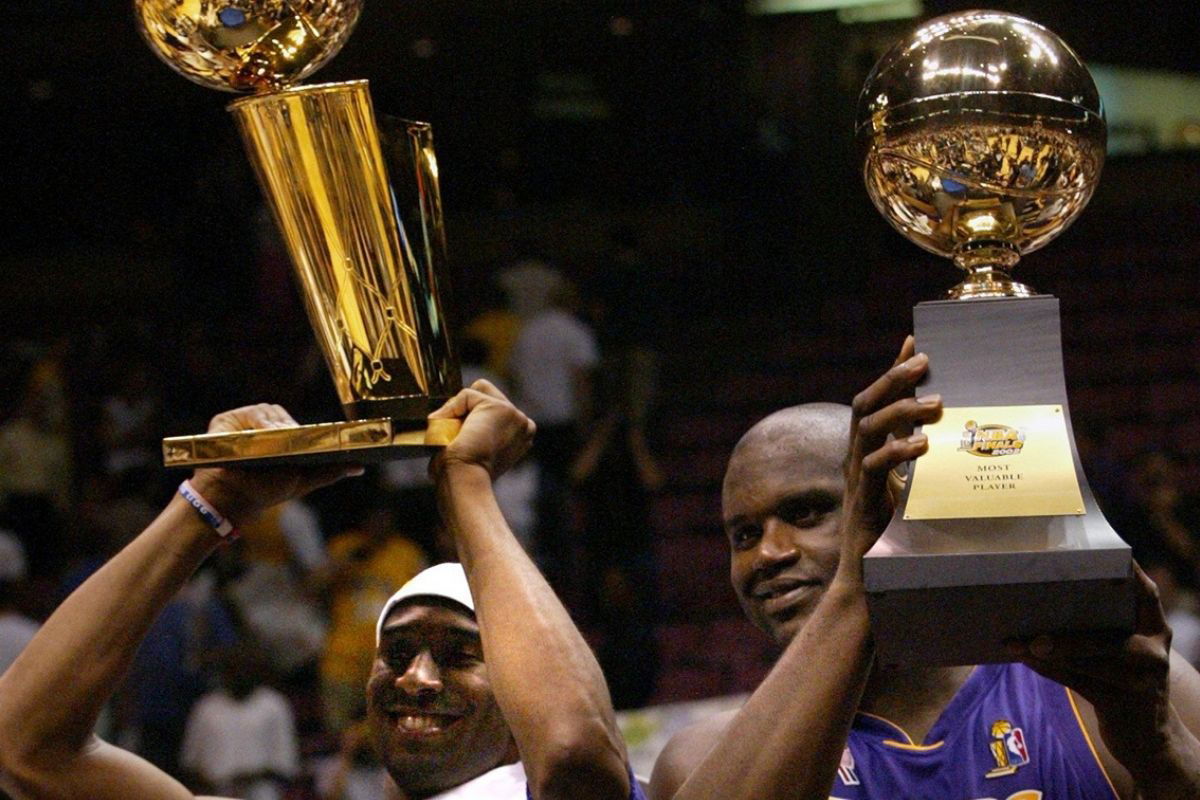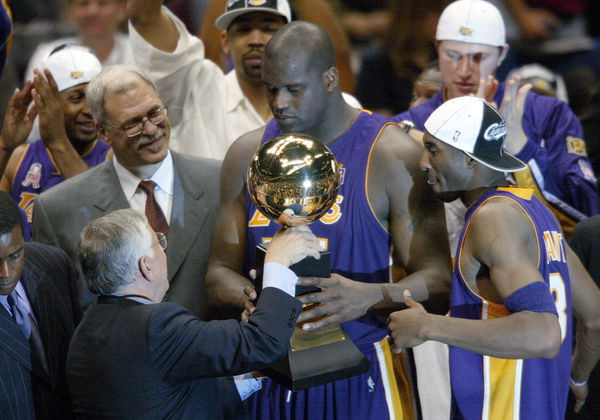

The hardest choice in basketball is always to pick between two greats. And just like any other era, the 90s and early 2000s too had their share, but a few, like that of Shaq or Kobe, remain evergreen. To be fair to them, when two giants of the game play under the same roof, it surely ignites competition over who’s the best. But someone like Gary Vitti, who’d been around them for decades and saw the cracks forming up close, just offered a new perspective. And no, he doesn’t think their competition was to blame.
Watch What’s Trending Now!
Gary Vitti isn’t just some guy with an opinion. After spending over 30 years as the Lakers’ head athletic trainer, from the Showtime dynasty to Kobe’s last game, he understood the Lakers locker room a bit more than anyone else. And according to him, during that period, everyone fell prey to something. “A team is like a family, and you may get mad at somebody in your family. You might get angry with your mom or your dad, or your brother, sister. But you don’t stop loving them. Facts. And that’s the difference. And in that era, we stopped loving each other,” Vitti said in the podcast. But it wasn’t Kobe and Shaq fueling the rivalry, as per him.
So when Vitti spoke in a recent episode of Byron Scott’s Fast Break podcast, he dropped a truth bomb about the Kobe-Shaq split. “People started choosing sides. And so it’s easy to blame Kobe. This really bothers me… cuz we should have won 10 championships today. It’s easy to blame Kobe, and it’s easy to blame Shaq. What about the rest of us, including me?” he said. For casual fans, it’s a rivalry, but Vitti had more to it. Everything else that came out of this rivalry was a byproduct, but what fueled it was innocent ignorance.
“There’s other players, there’s management, there’s ownership, coaches, people chose sides. Hey, people on the team, players chose sides, right? Coaches chose sides. The fans chose sides, okay? And it was divisive, and the whole thing crumbled.” What could have been two greats lighting up the Lakers’ history turned into a bitter memory.

Getty
Shaquille O’Neal (L) and Kobe Bryant of the Los Angeles Lakers talk during the 1st quarter of game two of the NBA Finals against the New Jersey Nets 07 June 2002 at the Staples Center in Los Angeles, CA. The Lakers have a 1-0 lead in the best-of-seven series. AFP PHOTO/Lucy NICHOLSON (Photo by LUCY NICHOLSON / AFP) (Photo credit should read LUCY NICHOLSON/AFP via Getty Images)
When the duo aced, the Lakers went all out to protect Kobe, but Shaq, even if one of the best on that team, didn’t get his share of attention. And everyone was guilty of it. “And I think that I’m as guilty as everyone else because I think that, looking back on it, Shaq was hurt. Doesn’t mean he shouldn’t have played. There’s things that we could do to mitigate some of the things that he had. But it doesn’t mean he wasn’t hurt.” The Lakers ignored the basics, even when Shaq was craving them, eventually leading to an even wider gap. But he was dropping signs, too.
Shaq is a big man, and even if it benefited him on the court, some issues required attention. Vitti then pointed out an incident where Shaq had to go to lengths to explain to him that he needs attention. “It was him making a point. He pulled the hair on my arm.”That hurt.” I said, “Yeah, it hurt.” Goes, “Yeah, that. “Yeah, that hurts me, too.” When somebody pulls my meaning, yeah, I’m big. I’m strong, but I get hurt, too. I get hurt, too.” Next, Vitti explained what bothered Shaq that it took him to put a practical example to make the trainer realize his point.
“Anybody that has that joint, that first joint where you, that the metatarsal comes out and meets your big toe, that’s where you toe off. Well, he was 350-something pounds. Now, he had a big, big toe and a big metatarsal, but still, it’s a lot of weight. Anybody, you know, and we put a plate in there trying to offload it…you do things to help, but God bless him. I love him. He knows that I wish that I had done more in that regard.” Nothing emerged suddenly. Every move, every competition, every fallout between the two greats had a reason, and there’s no one better than a Gray Vitti to explain that story.
Shaq was reportedly jealous of Kobe’s jersey sales in 1998, accused Kobe of playing selfish basketball. Then the “inside joke” mocking Kobe during All-Star introductions in 2000, and the open feuds when Shaq came into camp out of shape in 2001. Phil Jackson even called them both “juvenile.” By then, the fight for glory had gone from competition to division. By 2003-04, even with stars like Karl Malone and Gary Payton in the mix, nobody was safe from the tension. Public shots were being fired, team dinners were skipped, and friendships were on shaky ground.
Phil Jackson had to step in and tell Kobe and Shaq to shut up, while Brian Shaw found himself playing peacemaker after Shaquille O’Neal yelled, “pay me” at Dr. Buss. And it didn’t end there—after his trade to Miami in 2005, Shaq said, “He [Buss] had to make a choice, the young guy [Bryant] or the old guy. He made his choice, and good luck with his choice.” Years later, he even shifted the blame, claiming Phil sensationalized the whole feud to the media.

USA Today via Reuters
June 12, 2002; East Rutherford, NJ, USA; NBA commissioner David Stern hands Los Angeles Lakers Phil Jackson (left), Shaquille O’Neal (center) and Kobe Bryant (right) their championship trophy at the end of Game 4 of the NBA Finals at The Meadowlands. Mandatory Credit: Robert Deutsch-USA TODAY Sports
In the end, it felt like the drama had pulled everyone into its orbit. But don’t think there wasn’t competition between the two. While Vitti believes Kobe and Shaq aren’t to blame, both have admitted over time that they wanted to beat each other to a championship. That drive just added more fuel to the fire.
Shaquille O’Neal pushed Kobe Bryant’s buttons to spark wins
By now, it is not unknown what that feud was. Shaquille O’Neal once likened his dynamic with Kobe Bryant to something out of The Godfather. Sitting down on Armchair Expert, he admitted flat out, “And if you look at our relationship, it’s the classic tale of the Godfather. You got the godfather who came from Orlando, and he’s the godfather.”
“People don’t understand everything I did was planned… I don’t want us to get along. I want us to f— win.” In his mind, the best way to get Kobe to that level was to poke at him, sometimes hard. He painted the picture himself: “He’s [Kobe] Michael. Yes, I’m the Godfather… when I came to LA, I was already established… I was the biggest thing in the league. So, he’s there and he wants it.” And Shaq made sure Kobe knew exactly where he stood. “This ain’t your team. This my team, little m———–. They can scream Kobe all they want, this is my m—- team.” He knew those words would light a fire. The result?
Kobe would “go shoot a million times” just to prove him wrong, and Shaq loved it. If he dropped 28–30 points and Kobe tried to top him, that was 60 combined points for the Lakers. “I knew exactly what I was doing,” he said. “If I know you’re going to give me your best when you’re upset, I’m gonna make you upset.” Even Phil Jackson was part of the mind game. When Brian Shaw once asked why Phil never scolded Kobe, Phil simply said, “I always want Kobe to be in attack mode.” Shaq’s reaction? Perfect. “I knew exactly what I was doing… the more marketability we have, the more money we have.” And in the end, both got what they wanted, just not together.
Shaq grabbed his first title without Kobe Bryant in 2006, while Kobe went on to win back-to-back in 2009 and 2010. For Kobe, it was personal: “It was always the challenge of, ‘Kobe can’t win without Shaq,’ right?… I didn’t want to hear that.” But despite the jabs, the competition, and the media framing it as a rivalry where fans had to pick sides, there was still respect. The story of Shaq and Kobe was never just about tension, but two relentless competitors who knew exactly how to push each other to greatness.

